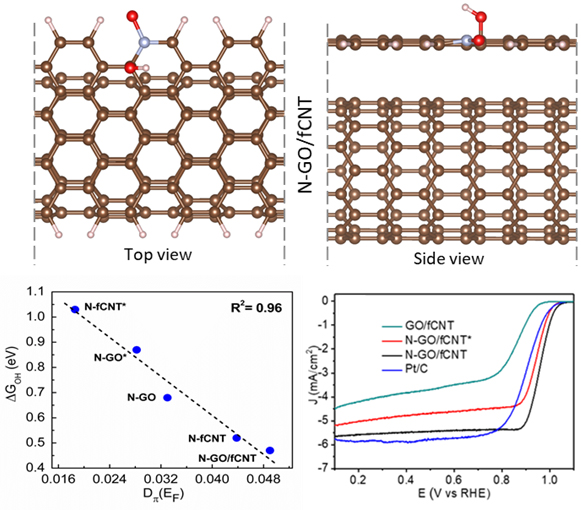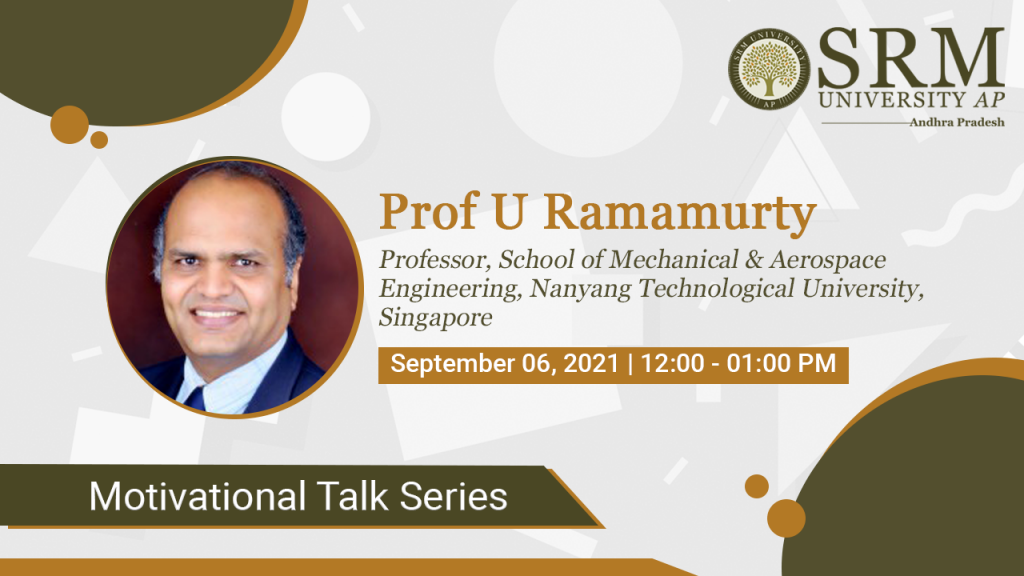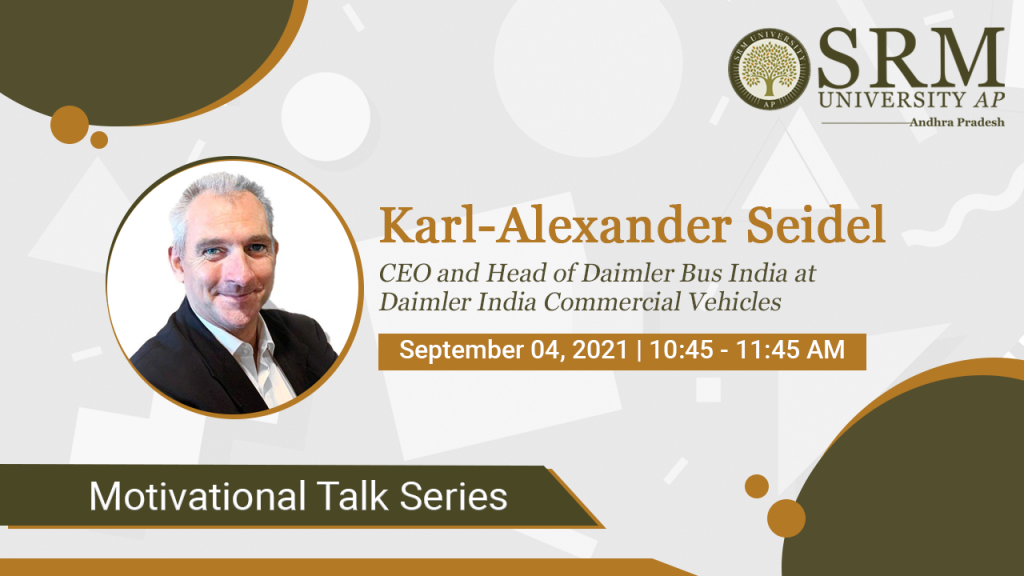- Dr Pitchaiah Cherukuri September 6, 2021
- Cost-effective electro-catalyst for oxygen reduction reaction September 6, 2021
 A research paper titled “Nitrogen doping derived bridging of Graphene and Carbon Nanotube composite for oxygen electroreduction” has been published by Prof Ranjit Thapa, Professor of Physics, SRM University – AP, as a co-author, in International Journal of Energy Research, having Impact Factor of 5.164.
A research paper titled “Nitrogen doping derived bridging of Graphene and Carbon Nanotube composite for oxygen electroreduction” has been published by Prof Ranjit Thapa, Professor of Physics, SRM University – AP, as a co-author, in International Journal of Energy Research, having Impact Factor of 5.164.In this work, the research group investigated the origin of high catalytic activity of oxidic-N configuration in nitrogen-doped CNT and graphene heterostructure using density functional theory (DFT). We have plotted the free energy profile of the oxygen reduction reaction (ORR) to estimate the thermodynamic overpotential and catalytic performance of the respective active sites. The overpotential is related to the quantifying parameter ∆GOH (with R2 = 0.98) and the π electron density at the Fermi level, defined as an electronic descriptor, which is highly correlated with the ∆GOH with R2 value 0.96. For various N doped configurations, we correlated the ∆GOH values with π electron density at the Fermi level and found that the carbon site adjacent to the oxide-N configuration is a more prominent site for ORR. Further, we show that the oxidic-N configuration in the heterostructure of graphene and CNT is the ideal configuration, which gives a lower overpotential of 0.54 eV for ORR on adjacent carbon sites. Therefore, the charge transfer occurs from underneath CNT to graphene and increases the value of π electron density at the Fermi level which leads to the higher catalytic performance of the active site.
In the early 20th century, fuel cells were invented and their global impact has not reached up to its regular commercialization when compared with battery technology. The fuel cell device could be a powerful technique to generate electricity for large energy demand without greenhouse gas emissions. However, other major hurdles in the commercialization of fuel cell devices are the cost of platinum (as a catalyst), its poisoning and stability. Recently, carbon-based materials such as graphene, carbon nanotubes and activated carbon have been evolved as metal-free low-cost catalysts due to their (i) high abundance/yield (ii) reactivity towards oxygen just by introducing impurities like heteroatoms or other metals. However, identifying an efficient design principle to search optimal doping configurations in various carbon systems is a grand challenge for researchers.
This work is done in collaboration with Research Institute, SRM Institute of Science & Technology, Kattankulathur-603203, Chennai (India).
In future, the study aims to propose the effective design principle for various doped carbon systems as a catalyst to identify the optimal active sites and configurations for ORR. The role of π orbital in carbon systems such as graphene, graphene nanoribbons, carbon nanotube, etc is very important and can be a general electronic descriptor to define catalytic activity. Also, π electron descriptors and machine learning algorithms based combined approach can boost the search for ideal carbon catalyst for ORR with low DFT cost.
Read the full paper here: https://doi.org/10.1002/er.7179
Continue reading → - Motivational session with Professor Upadrasta Ramamurty September 4, 2021
 Freshmen Orientation Programme-2021 welcomes Professor Upadrasta Ramamurty, School of Mechanical & Aerospace Engineering, Nanyang Technological University, Singapore, to deliver a talk on September 06, 2021, at 12 noon.
Freshmen Orientation Programme-2021 welcomes Professor Upadrasta Ramamurty, School of Mechanical & Aerospace Engineering, Nanyang Technological University, Singapore, to deliver a talk on September 06, 2021, at 12 noon.Professor Upadrasta Ramamurty received a Bachelor of Engineering (Metallurgy) degree from Andhra University in 1989 and a Master of Engineering (Metallurgy) degree from Indian Institute of Science in 1991, both with a Metallurgy specialisation, as well as a Doctorate of Philosophy degree in Engineering from Brown University in 1994. His postdoctoral research was carried out at the University of California-Santa Barbara and the Massachusetts Institute of Technology.
Professor Ramamurty is a widely respected researcher who has co-authored over 250 papers in peer-reviewed international journals that have been referenced over 9000 times (with a Hirsch index of 46) in both the Web of Science and Scopus databases. Several honours, including the Chinese Academy of Sciences’, the Lee Hsun Lecture Award of the Chinese Academy of Sciences, TWAS Prize (Engineering Sciences), CNR Rao Prize Lecture in Advanced Materials of Materials Research Society of India, J.C. Bose National Fellowship and Swarnajayanthi Fellowships of Government of India, Metallurgist of the Year Award by Indian Institute of Metals, and Scopus Young Scientist Award, have acknowledged his research efforts.
Professor Ramamurty is an elected fellow of the Indian National Science Academy, the Indian National Academy of Engineering, the Indian Academy of Sciences, and The World Academy of Sciences (TWAS). He held numerous distinguished/invited professor/scientist positions around the world, including the Institute of Materials Research (IMRE) in Singapore, Zhejiang University in China (Qiushi Distinguished Visiting Professor), Université de Lorraine in France (Exceptional Class Professeur invité), Jawaharlal Nehru Centre for Advanced Scientific Research in India, and the Massachusetts Institute of Technology.
Since 2014, Professor Ramamurty has served as an Editor for Acta Materialia and Scripta Materialia. Professor Ramamurty’s research focuses on addressing fundamental scientific and technological difficulties in the materials/mechanics domains, which have direct implications for advanced manufacturing as well as component structural integrity and reliability.
Professor Ramamurty made significant contributions to the understanding of the mechanical behaviour of advanced metallic alloys, composites, and molecular crystals during the course of a nearly three-decade professional career. The nature of his work is both fundamental as well as applied and hence was continuously supported by industrial giants like Boeing, General Motors and Rolls Royce.
Continue reading → - Insightful discussion with Mr Karl-Alexander Seidel September 3, 2021
 In the next chapter of Freshmen Orientation Programme-2021, a special talk will be delivered by renowned corporate mogul Mr Karl-Alexander Seidel. Mr Alex is the CEO and Head of Daimler Bus, India at Daimler India Commercial Vehicles. The talk has been scheduled for September 04, 2021, at 10.45 am and aims to provide an insight of the industry and its culture.
In the next chapter of Freshmen Orientation Programme-2021, a special talk will be delivered by renowned corporate mogul Mr Karl-Alexander Seidel. Mr Alex is the CEO and Head of Daimler Bus, India at Daimler India Commercial Vehicles. The talk has been scheduled for September 04, 2021, at 10.45 am and aims to provide an insight of the industry and its culture.Mr Karl-Alexander Seidel started his career at Daimler in 2001. Between then and 2014, he held a variety of management functions in the fields of Reporting, Business Development, Product Planning and Homologation, mainly in Daimler’s commercial vehicles division, as well as at TASIAP GmbH in Stuttgart. Since 2014 he has been working for Daimler in India, where he was initially responsible for powertrain supplier management. Between 2016 and 2017 he was in charge of the “Logistics, Supplier & Quality Management” department at Daimler Buses in India before assuming his current function in 2017.
Mr Karl-Alexander Seidel is a highly competent commercial vehicles manager with many years of India-related experience from our bus business in Chennai. In recent years he has made a significant contribution to building up our Indian bus production activities by implementing corresponding supply and logistics flows, as well as the corresponding quality management.
Continue reading → - Dr. Kshira Sagar Sahoo September 3, 2021

